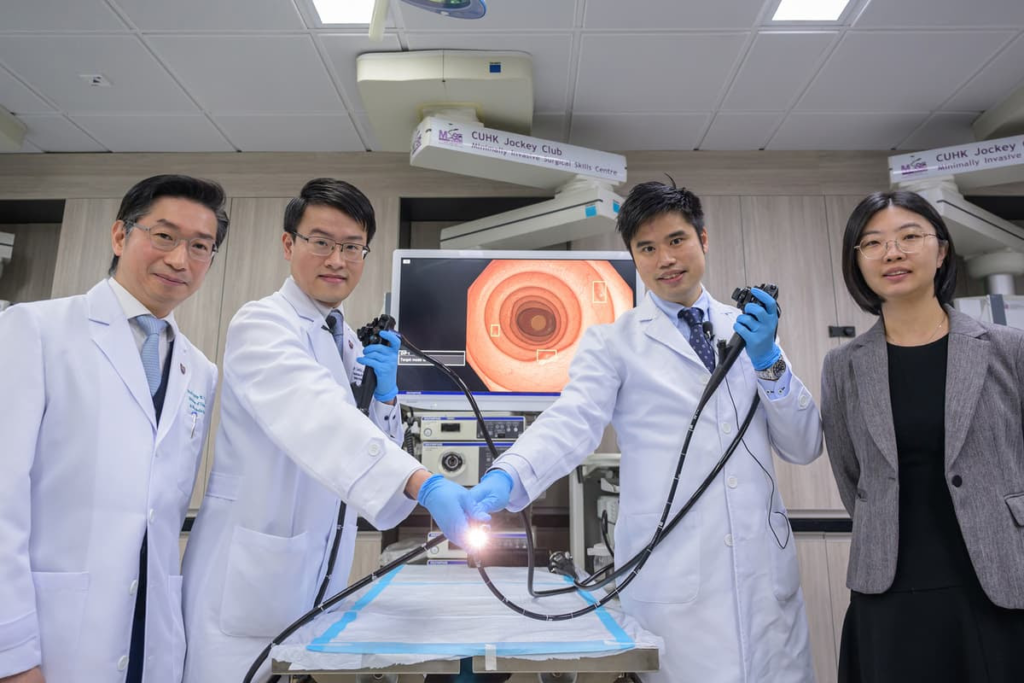By Paul McClure

Researchers found that colonoscopy assisted by AI improved the detection of polyps by inexperienced doctorsCUHK/CU Medicine
Researchers have found that inexperienced doctors performing AI-assisted colonoscopies significantly improved their detection of polyps. Using AI with this diagnostic tool could lower the chances of missing these potential precursors to colorectal cancer.
The addition of AI has led to the enhancement of several medical diagnostic tools, including mammography, ultrasound, and MRI. Now it’s colonoscopy’s turn to get a computer-aided upgrade.
Colonoscopy, the insertion of an endoscope into the colon to examine its interior walls, reduces the incidence of colorectal cancer-related death by detecting and removing premalignant polyps, otherwise known as adenomas. However, as a diagnostic tool, colonoscopy can be imperfect; up to 26% of adenomas and 9% of advanced adenomas can be missed, increasing the risk of adverse outcomes and mortality. Reasons adenomas are missed include flat morphology, poor bowel preparation, and insufficient endoscopist experience.
Now, researchers from the Chinese University of Hong Kong’s (CUHK) Faculty of Medicine have examined whether AI-assisted colonoscopy improved the adenoma detection rate (ADR) when an inexperienced doctor wielded the scope.
“Our research is significant for the future development of AI in clinical medicine and endoscopic training,” said Louis Lau Ho-shing, the study’s lead author. “Junior endoscopists are generally less skillful and require a higher level of assistance during their initial learning phases. Our research is significant for endoscopic training because it shows that the use of AI provides them with imagery guidance to practice the skills in a more standardized manner. Results confirmed that the innovation helps enhance adenoma detection ability among endoscopists with different levels of experience.”
The AI used was computer-aided polyp detection (CADe), a deep learning system that previous trials have reported provides a significant clinical benefit to real-time adenoma detection. Between April 2021 and July 2022, the researchers recruited 22 junior endoscopists with personal experience of less than 500 endoscopies and less than three years’ training to study their performance using the AI-assisted endoscopy system. Endoscopists were stratified into beginner (less than 200 procedures) and intermediate (200 to 500 procedures) groups.
The study’s primary endpoint was ADR. Second endpoints included ADR for adenomas of different sizes (less than 5 mm, 5 to 10 mm, greater than 10 mm) and locations. An advanced adenoma, a precursor to colorectal cancer, was defined as being equal to or greater than 10 mm.
The endoscopists-in-training performed colonoscopies on 766 patients; 386 were assigned to the CADe group, and the rest received a conventional colonoscopy. Overall, the ADR was significantly higher in the CADe group compared to the control group: 57.5% versus 44.5%, respectively. The ADRs for adenomas less than 5 mm were 40.4% in the CADe group versus 25.0% in the control group; for 5-10 mm adenomas, it was 36.8% and 29.2%, respectively. There was no significant difference in ADRs for advanced adenomas. The ADRs were higher in the CADe group among the beginner (60.0% vs 41.9%) and intermediate-level (56.5% vs 45.5%) endoscopists.
The researchers say that the benefit of CADe for large and advanced adenomas remains unclear. They recommend optimizing the algorithm’s performance and the concurrent development of computer-aided adenoma diagnosis systems. Nonetheless, based on their findings, they advocate for incorporating AI devices into endoscopy training curricula.
The study was published in the journal Clinical Gastroenterology and Hepatology.
Source: CUHK

Leave a Reply